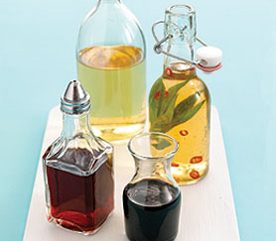Versatile Vinegars
Vinegar has been used for centuries to flavour and preserve food. Most contain healthy antioxidants and nutrients derived from the grain, fruit or sugar used to produce them.

Since each type of vinegar has its own taste, it will work best with certain foods to enhance flavours. Knowing which vinegars to pair with food can turn the ordinary meal into a gourmet delight.
Create your own vinegars by adding fresh herbs, chilies or fruit to cider or wine vinegars. Store in tightly sealed bottles in a dark place. The acetic acid will keep the herbs or fruit from spoiling.
Apple Cider Vinegar
Sharp and refreshing, this golden-coloured vinegar is good in dressings for cheese and ham salads.
Balsamic Vinegar
Dark, richly complex in flavour, balsamic vinegar has a mild sweetness and a slight acidity. It originated in Modena, Italy, and is considered by many to be the best quality vinegar available. It is produced from a type of red wine and the most prized-and expensive-varieties are aged for from 15 to 50 years in wood barrels. Prices vary accordingly. Buy the best you can afford. It goes well with tomato or berry salads.
Champagne Vinegar
A mild, light vinegar fermented from champagne. Rice vinegar can be used in its place. Champagne vinegar goes well in vinaigrettes and dressings for chicken, veal, fish or vegetable salads.
Red Wine and White Wine Vinegar
The classic wine vinegars’ taste depends on the wines used and their maturity. Red wine vinegar is slightly more robust. Sherry vinegar has an even fuller flavour. It goes with rice, grain, meat or fish salads. Cassis vinegar is a specialty vinegar made of blackcurrants and red wine. The bitter fruity vinegar goes well with oak leaf lettuce as well as mushrooms, beef or tuna.
Rice Vinegar
Used in Asian cooking, spicy, aromatic rice vinegars are sweeter and milder than Western ones because of a lower acid content. Use with rice or grain salads.



